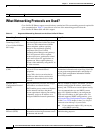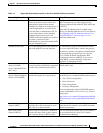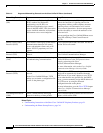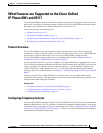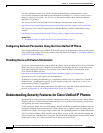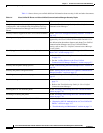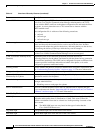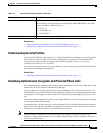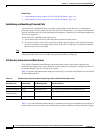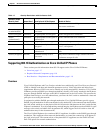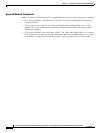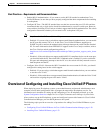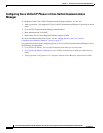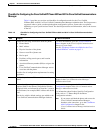
1-14
Cisco Unified IP Phone 6901 and 6911 Administration Guide for Cisco Unified Communications Manager 8.5 (SCCP and SIP)
OL-23874-01
Chapter 1 An Overview of the Cisco Unified IP Phone
Understanding Security Features for Cisco Unified IP Phones
Secure SRST reference After you configure a SRST reference for security and then reset the dependent
devices in Cisco Unified Communications Manager Administration, the TFTP
server adds the SRST certificate to the phone configuration file and sends the file to
the phone. A secure phone then uses a TLS connection to interact with the
SRST-enabled router.
The configuration file is with one of the following extensions:
• .cnf.xml
• .cnf.xml.sgn
• .cnf.xml.enc.sgn
Media encryption Uses SRTP to ensure that the media streams between supported devices proves
secure and that only the intended device receives and reads the data. Includes
creating a media master key pair for the devices, delivering the keys to the devices,
and securing the delivery of the keys while the keys are in transport.
Signaling encryption Ensures that all SCCP and SIP signaling messages that are sent between the device
and the Cisco Unified Communications Manager server are encrypted.
CAPF (Certificate Authority Proxy
Function)
Implements parts of the certificate generation procedure that are too
processing-intensive for the phone, and interacts with the phone for key generation
and certificate installation. The CAPF can be configured to request certificates from
customer-specified certificate authorities on behalf of the phone, or it can be
configured to generate certificates locally.
Security profiles Defines whether the phone is nonsecure, authenticated, encrypted, or protected. See
the
“Understanding Security Profiles” section on page 1-15 for more information.
Encrypted configuration files Lets you ensure the privacy of phone configuration files.
Optional disabling of the web server
functionality for a phone
You can prevent access to a phone’s web page, which displays a variety of
operational statistics for the phone.
Phone hardening Additional security option, which you control from Cisco Unified Communications
Manager Administration:
• Disabling access to web pages for a phone
802.1X Authentication The Cisco Unified IP Phone can use 802.1X authentication to request and gain
access to the network. See the
“Supporting 802.1X Authentication on Cisco Unified
IP Phones” section on page 1-17 for more information.
Voice Quality Metrics
MOS LQK Objective estimate of the Mean Opinion Score (MOS) for Listening Quality (LQK)
that ranks audio quality from 5 (excellent) to 1 (bad). This score is based on
audible-concealment events due to a frame loss in the preceding 8 seconds of the
voice stream.
Note The MOS LQK score can vary based on the type of codec that the
Cisco
Unified IP Phone uses.
Avg MOS LQK Average MOS LQK score for the entire voice stream.
Min MOS LQK Lowest MOS LQK score from the start of the voice stream.
Table 1-5 Overview of Security Features (continued)
Feature Description



